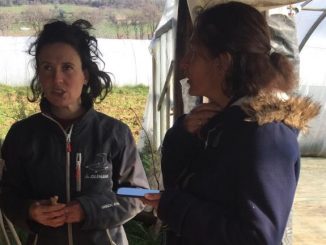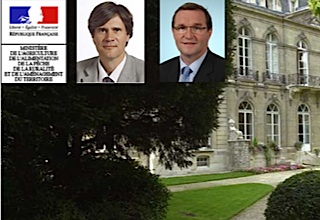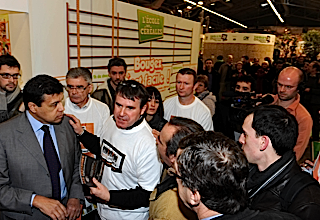
Throughout the election campaigns in France, the multi-NGO platform Group PAC2013 has interviewed the EU farm policy leaders from different political groups running for the President. This does not include the Front National who wish to pull out of the CAP. Between the two rounds of the election for the next president, they have published the responses of UMP (Conservative Party) leader on agriculture, MEP Antoine Herth, and those of Stéphane Le Foll, EU MEP and Campaign Coordinator for the Socialist Party.
On the whole, statements and opinions are very cautious: a strong CAP after 2013, a budget as it stands now, market regulation instruments to be kept or restored, historical decoupled subsidies to be phased out, employment and environment issues to be better integrated. The one area where a difference exists is Pillar 2: an administrative burden vs an opportunity.
The responses will be posted in two posts. Here is the first.
On the CAP budget after 2013…
For the UMP group, the objective is to guarantee that interests of France are preserved by keeping the budget as it is now, with a hierarchy of Pillar I over Pillar II. “Pillar II is important, but its complexity to implementation calls for this hierarchy” said Mr Herth.
Given the uncertainty of the budget after 2013, Mr Le Foll said that “despite the crisis, we shall maintain the CAP budget.” If the EU budget were to drop, which he hopes it will not, “the debate will be tense on the rate of return on the Pillar I money, and the Green component may not be that proposed today.”
On Greening Pillar I…
Mr Herth agreed with the Commission’s proposals but disagreed with the wording used: “We have to recognise the farmers’ efforts. Following the example of Ecophyto 2018 plan [to reduce pesticide use by 50% towards 2018], farmers have already reached a 10% rate of greening and then the objective is 30%“. However he remained skeptical about the 30% of national ceilling aid dedicated to it. There must be clear and precise rules for all farmers in the EU-27. “Do not create a burden while others in the EU have a level of standards lower than ours” he warned. On EFA, he said “3% is a minimum to maintain a “saltus”, he means uncultivated land on each farm.
According to Mr Le Foll “The great challenge is to reconcile ecology and economy.” He supported the Commission’s proposals of 30% devoted to a new “green” payment, including 7% of ecological focus areas (EFA) on each farm, but he suggests including certain areas engaged in agri-environmental measures i.e. low external inputs sustainable farming – within the EFA.
On protein deficit and leguminous plants…
According to Mr Herth, “The EU has an interest in improve protein self-sufficiency in livestock farms, for instance by introducing more alfalfa in rotations.” He believes that “crop diversification” proposed by the EC under the green component could also contribute.
Le Foll agrees on this point, but recognised “It would need to boost leguminous plants through Pillar II”.
Rural development and agri-environmental measures (AEM)…
For Mr Herth, management of rural development programs must remain at the national level, because “It’s in the French republican tradition“. Mr Le Foll is more open to greater involvement of regional authorities. Mr Herth said that “The previous experience of land management contracts at the begining of the last decade has been the sin of pride to want to take everything into account at farm level (both employment and environmental concerns)“. According to him, AEM remain the most successful even if they often target the same farmers.
Le Foll said “We must create a new legal framework after those of modernization in the 60’s. We must re-create ecological and economic cooperatives that allow a departure from public intervention mainly focused on individual farmholdings. Should we encourage bio-gas production on each farm? It costs too much. We must raise awareness of the environmental dimension through collective approaches. This new dynamic could interest regional authorities, but the legal framework should be set at national level. “





